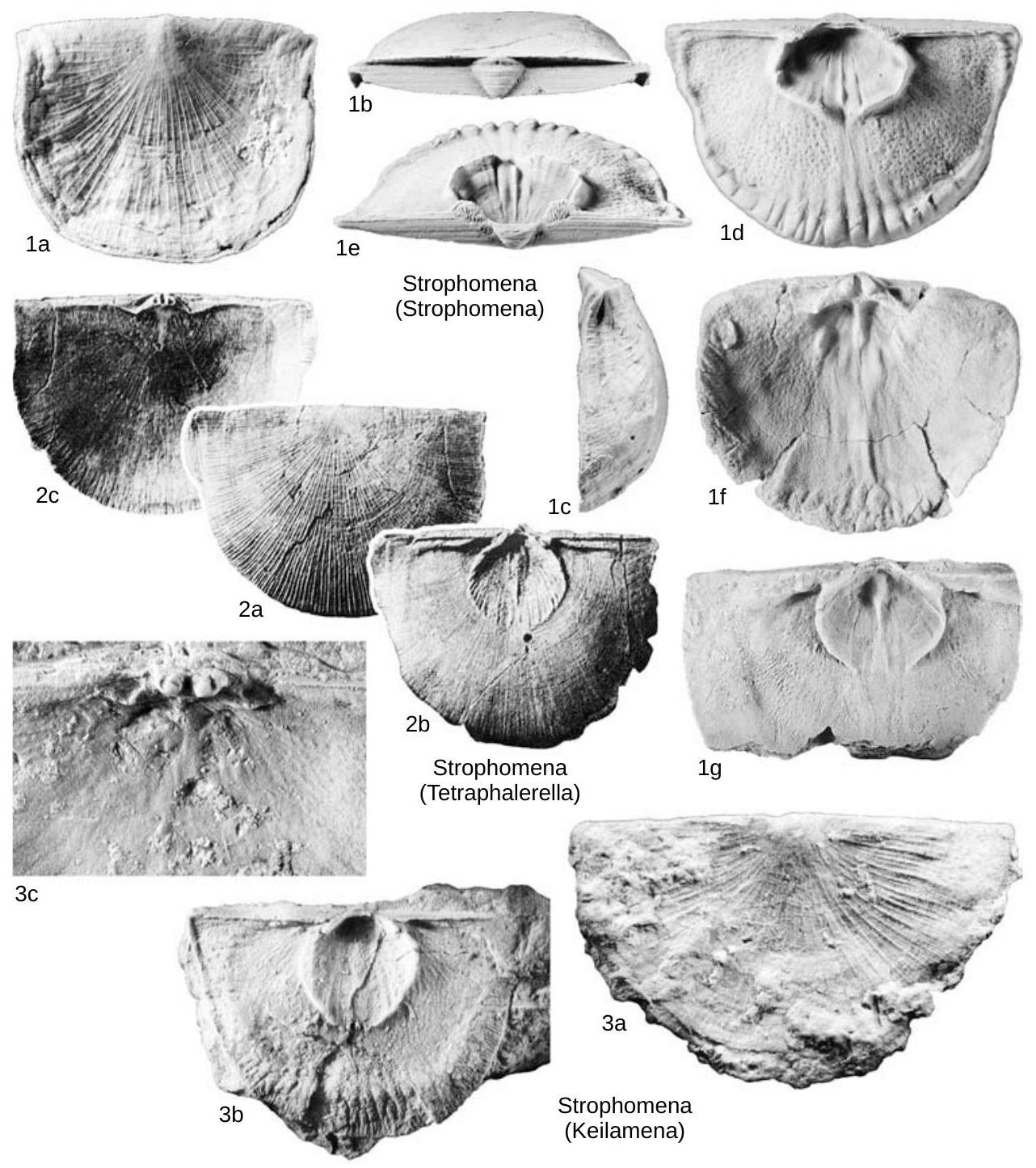Welcome to the Treatise on Invertebrate Paleontology!
Please enter a genera name to retrieve more information.

Strophomena
Classification
Phylum:
Brachiopoda
Subphylum:
Rhynchonelliformea
Class:
Strophomenata
Order:
Strophomenida
Superfamily:
Strophomenoidea
Family:
Strophomenidae
Subfamily:
Strophomeninae
Formal Genus Name and Reference:
Strophomena Rafinesque in de BLAINVILLE, 1824, p. 302
Type Species:
Leptaena planumbona Hall, 1847, p. 112, SD ICZN Opinion 1671, 1992
Images
(Click to enlarge in a new window)
Fig. 135, 1a–f. *S. (S.) planumbona (H ALL ), Trenton Group, Caradoc, Cincinnati, Ohio; a–c, lectotype, ventral, posterior, lateral views of conjoined valves, AMNH 30247, × 1.5; d,e, ventral, anterior views of ventral interior, AMNH 30248, ×1.5; f, dorsal interior, AMNH 918/5, ×1.5 (Rong & Cocks, 1994).— Fig . 135, 1g. S. adilensis (RÕÕMUSOKS), ventral interior, Adila Formation, Pirgu Stage, Ashgill, Vardi, Estonia, TAGI BR 1531, ×1.5 (Rõõmusoks, 1993b).
Synonyms
Rugomena
Geographic Distribution
North America, Europe
Age Range
Beginning Stage in Treatise Usage:
Ordovician (Caradoc)
Beginning International Stage:
Sandbian
Fraction Up In Beginning Stage:
0
Beginning Date:
458.18
Ending Stage in Treatise Usage:
Ordovician (Ashgill)
Ending International Stage:
Hirnantian
Fraction Up In Ending Stage:
100
Ending Date:
443.07
Description
Profile gently resupinate, ornament variable from parvicostellate to costellate, prominent pseudodeltidium, small chilidium, teeth strong, sometimes with irregular denticles, crenulations, dental plates extending into elevated bounding ridges largely surrounding the subcircular to rhomboidal ventral muscle field, adductor scars not enclosed by diductor scars, ventral myophragm sometimes present, socket ridges sometimes crenulated, strong, short median ridge coming from the posterior edge of notothyrium, ridge sometimes forked anteriorly, dorsal muscle field gently impressed, with weak bounding ridges sometimes present laterally, occasional weak transmuscle ridges sometimes present, often absent.
References
Museum or Author Information
Classification
Phylum:
Brachiopoda
Subphylum:
Rhynchonelliformea
Class:
Strophomenata
Order:
Strophomenida
Superfamily:
Strophomenoidea
Family:
Strophomenidae
Subfamily:
Strophomeninae
Formal Genus Name and Reference:
Strophomena Rafinesque in de BLAINVILLE, 1824, p. 302
Type Species:
Leptaena planumbona Hall, 1847, p. 112, SD ICZN Opinion 1671, 1992
Images
(Click to enlarge in a new window)
Fig. 135, 1a–f. *S. (S.) planumbona (H ALL ), Trenton Group, Caradoc, Cincinnati, Ohio; a–c, lectotype, ventral, posterior, lateral views of conjoined valves, AMNH 30247, × 1.5; d,e, ventral, anterior views of ventral interior, AMNH 30248, ×1.5; f, dorsal interior, AMNH 918/5, ×1.5 (Rong & Cocks, 1994).— Fig . 135, 1g. S. adilensis (RÕÕMUSOKS), ventral interior, Adila Formation, Pirgu Stage, Ashgill, Vardi, Estonia, TAGI BR 1531, ×1.5 (Rõõmusoks, 1993b).
Synonyms
Rugomena
Geographic Distribution
North America, Europe
Age Range
Beginning Stage in Treatise Usage:
Ordovician (Caradoc)
Beginning International Stage:
Sandbian
Fraction Up In Beginning Stage:
0
Beginning Date:
458.18
Ending Stage in Treatise Usage:
Ordovician (Ashgill)
Ending International Stage:
Hirnantian
Fraction Up In Ending Stage:
100
Ending Date:
443.07
Description
Profile gently resupinate, ornament variable from parvicostellate to costellate, prominent pseudodeltidium, small chilidium, teeth strong, sometimes with irregular denticles, crenulations, dental plates extending into elevated bounding ridges largely surrounding the subcircular to rhomboidal ventral muscle field, adductor scars not enclosed by diductor scars, ventral myophragm sometimes present, socket ridges sometimes crenulated, strong, short median ridge coming from the posterior edge of notothyrium, ridge sometimes forked anteriorly, dorsal muscle field gently impressed, with weak bounding ridges sometimes present laterally, occasional weak transmuscle ridges sometimes present, often absent.
